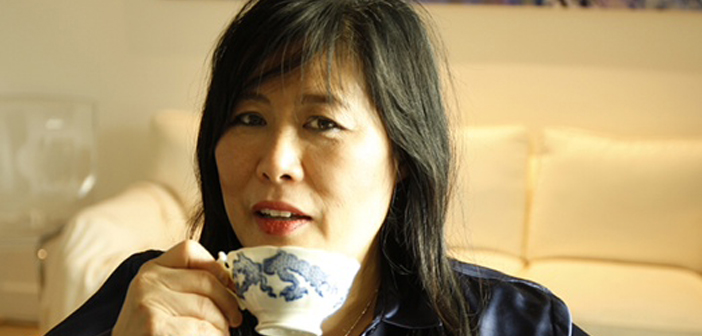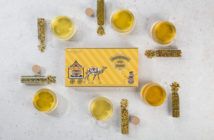A Toronto woman raises breast cancer treatment funds for plantation workers.
By Katie Cyr
A slim Sri Lankan woman walks alone through lush green fields. All is quiet except for the patter of her sandaled feet. The sky is still a dark blue, fading on the horizon into a lighter hue. It is five in the morning, and she has been walking for an hour now. Soon, her fellow tea pickers will rise with the sun, greeted by a shrill whistle signifying that another day of harvest is about to begin. She could have used the few extra hours of sleep, but a worry was nagging at her so fiercely she had no other choice but to quell it with footsteps. Although she has an arduous day ahead of her, a long, contemplative walk through the tea gardens, breathing in the mountain air, is helping calm her nerves.The scenery surrounding her is as familiar as the two leaves and a bud she picks every day. She has worked at this plantation from the age of fourteen, joining her mother in a practice that is dominated by Sri Lanka’s women. Men traditionally do not pick in the fields, as their fingers lack the grace, dexterity, and nimbleness required to pluck the correct leaves at such a rapid pace.
She can be found in the field for around eight hours a day, wearing a basket strapped on her forehead that hangs down her back. Into this basket, she gently deposits the leaves she steadily picks. Three to four times a day, she brings the basket for inspection, ensuring the leaves are of high quality, then continues picking again. It’s important to be fast, and to be good: Bonuses are given based on speed and meeting various daily targets. She stops for a lunch break in the shade, easing sore muscles down to spend time chatting amongst the other women. After the picking is done for the day, she will retreat back down another familiar path, retrieve her children from the plantation daycare, and sit down with her family to enjoy a meal, relax with neighbours, play cards, and prepare for the next day.
But not everything is so routine. The nagging worry that has rousted her before the daily whistle is a small lump felt under her left armpit. Discovered a few days ago, this small lump has settled itself in her mind, creating a wellspring of worry. She awoke early this morning with the word “cancer” repeating itself like a mantra. Could it be? Or is it nothing? Where do I go to seek help? Should I ignore it? These questions have been plaguing her for days now.
This woman’s worries are not uncommon. When a health problem of any sort presents itself to a tea plantation worker, professional help is not always easy to find. Plantations themselves are generally self-sufficient communities, with the workers’ day to day needs and services provided for within the confines of the plantation compound. Good tea plantations will provide services such as daycare, food, lodging, and access to healthcare. Unfortunately, that health care isn’t always enough. According to an e-book published by MJF Charitable Foundation, which was conceived in the 1950s by Merrill J. Fernando, founder of Dilmah Tea, oftentimes, “insufficient resources have resulted in these services being of poor standard, including basic healthcare.” This can be disastrous for those living on a plantation, who rely on it to assist with the basic necessities of life. When something out of the ordinary occurs—such as cancer—the challenges mount even higher.
The National Cancer Institute at Maharagama, which is in a suburb of Colombo, is Sri Lanka’s only facility dedicated to the treatment of cancer patients. In a country that boasts a population of more than 21 million people, this is a serious shortage of care for cancer patients. The MJF e-book notes that “the demands on the National Cancer Institute’s resources are extensive. Patients requiring tests and treatment are placed on waiting lists. The heaviest backlog for testing is breast cancer.”
All of these factors add up to an alarming question. In Western society, we rely on tea to bring comfort, balance, and warmth into our lives, but what is being done for the women who endure so much to bring us the gift of a perfectly plucked tea leaf? A journey of a thousand miles—let alone nine thousand—begins with one step, and a transformational journey can begin with a simple question. A woman who asked, and then answered, that question for herself is tea sommelier Carol Mark. Mark understands all too well the worry brought about by a breast cancer diagnosis, and her dedication and tireless commitment to the welfare of women half a planet away has made its mark on the tea community.
After spending just a short evening with Mark, it’s hard to believe this woman has been through the ravages of cancer. Her smile is wide, her embrace warm, and her energy level is unbelievable. I stepped into the cozy kitchen of the Depanneur Supper Club in Toronto one April evening to meet with Mark as she conducted a “cooking with tea” class. She hummed in the kitchen, calling recipes and tasting notes over her shoulder as she served up lapsang souchong-seared chicken and tofu with Chinese mushrooms.
Making sure her guests were comfortable, Mark passed around tea-dyed quail eggs while regaling her fascinated attendees with stories of her travels through Afghanistan, where she helped women in the war-ravaged country. Mark is a powerhouse, and has used her resources and knowledge to enhance the quality of life for hundreds of people within her community and internationally. She has been in remission for just over five years now, but she can recall perfectly her long journey through cancer and how it has tied her to the women of Sri Lanka.
Step back to the year 2008; a tiny lump has been discovered in Mark’s right breast. Shock, alarm, and worry have set in immediately, but she is faced with a nine-month delay in receiving a mammogram with her test results. Month after month goes by with mounting delays, confusing test results, and still more waiting. Finally, Mark, a successful art curator, mother, and loving wife, is diagnosed with stage 2 infiltrating ductal cancer. Her American husband insists she travel to the Mayo Clinic for a second opinion.
There, within a day, she is informed that three tumors were missed in all those months of testing. She makes the difficult decision to have a double mastectomy and chemotherapy in America. The cost is over $100,000, but at this point, time is running out, and her faith in the Canadian healthcare system is dwindling.
Sadly, a few months before her own diagnosis, a close friend of Mark’s who immigrated to Toronto from Sri Lanka, had passed away from breast cancer. Hema had been deeply involved in philanthropic work and wanted to do something in her home country for women with breast cancer. She had often shared stories of rural women journeying for days to seek treatment and then being forced to wander the streets, as they could no longer afford a place to stay after treatment.
Hema had been an instrumental driving force in Toronto’s health community, advocating for breast care and awareness for immigrant women. Mark promised Hema that she would honor her memory by taking on the mission to do whatever she could to fulfill her friend’s dream of bringing care to these deserving women, both in Sri Lanka and Toronto’s immigrant community.
After her own personal diagnosis, Mark mused, “One of the biggest challenges was changing my belief system in this battle from just surviving, to really living.” She also decided not to just be content with waiting. Instead, she focused on her promise to Hema while relying on the love and support of her husband and then 15-year-old daughter.
It was during her battle, and her slow but steady recovery, that Mark rediscovered her love of tea. She says that in her Chinese culture, tea has always been used as a medicine, and that history translated into her approach to recovery. She sought out and relied on tea’s health benefits and soothing properties, which branched into studying for and receiving her certification as a tea sommelier.
It was a simple grocery trip that would spark the change in many people’s lives. While running errands on a busy afternoon, Mark happened to pick up a box of Dilmah Tea. She reminisces that she was “fascinated with the picture of Merrill Fernando and his story of tea mixed with helping his country.” The Dilmah motto is: “Business is a matter of human service.” Something resonated deep inside Mark as she read this. Her thoughts flashed to Hema, who, even while in palliative care, was compassionately visiting other patients. She also felt this motto connected to her own life, as philanthropy had always been ar passion of hers.
She rushed home to write to Merrill, using the contact information on the tea box. A few days later, Mark was surprised and delighted to hear back from Merrill himself. He had read her story about her promise to Hema, combined with her own journey through cancer, and he pledged to help Carol in whatever way she needed to make her promise a reality.
Fast-forward. Shards of light dance through a crystal chandelier as an excited energy hums through the grand ballroom in Toronto’s St. Lawrence Town Hall. It’s June 18, 2011, and “The Art of Tea,” an event Mark has worked relentlessly hard to nurture into fruition, is about to start. The Art of Tea is Mark’s solution to fulfilling Hema’s wish, giving back to her own community and to Sri Lankan women.
After extensive planning, and with the generous aid of Merrill and Dilhan Fernando, the opulent event attracted over one hundred guests. Dilhan and tea sommelier Jane Pettrigrew conducted a tea master’s class for a fascinated room. A traditional afternoon tea came afterwards, which the Consul General of Sri Lanka attended.
Looking back, Mark proudly reminisces about how perfectly that day went. She calls Merrill and Dilhan her helpers and role models; what inspires her is their ability to blend their passions of tea and humanity together.
Currently, Mark is planning her upcoming trip to Sri Lanka to volunteer at the MJF Foundation and see in person the result of her efforts. She has also launched her company, The Love of Tea, which she uses for event planning, selling select rare blends of her favorite teas, and working in conjunction with health initiatives at both local and international levels.
The proceeds raised from The Art of Tea went directly to the MJF Foundation in Sri Lanka. With the money raised, the foundation was able to donate a desperately needed mammography machine, the required films and envelopes, and an ultrasound scanner to the National Cancer Institute. Through this donation, the foundation has been able to provide a free breast cancer screening program to the public. Since the equipment’s installation, more than 4,000 free screenings have been carried out.
This is the first step towards early detection. No longer will a Sri Lankan woman be shaken from sleep, consumed with the devastating fear of a lump and the question, “where do I go for help?” There is support, there are options, and, thousands of miles across the globe, there are people thinking about her, walking alongside her, step by step and sip by sip.
For more information on the MJF Foundation, please visit www.mjffoundation.org. Carol Mark can be reached through her website at www.theloveoftea.ca.




